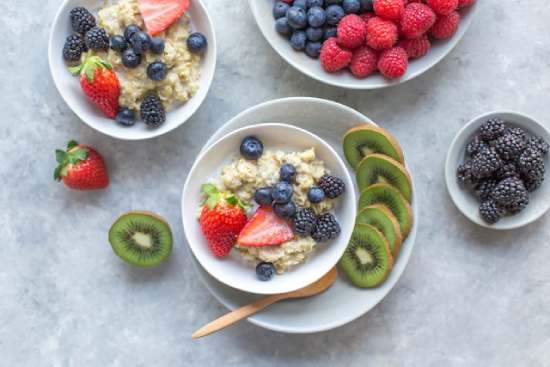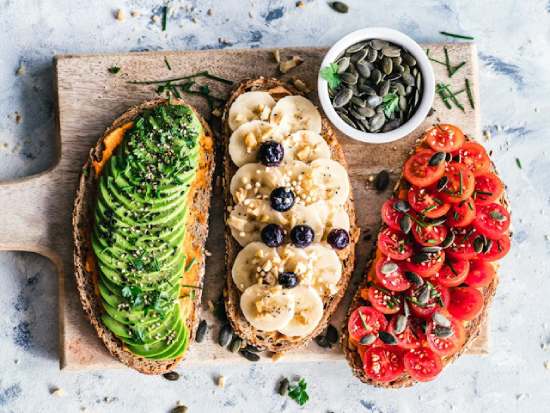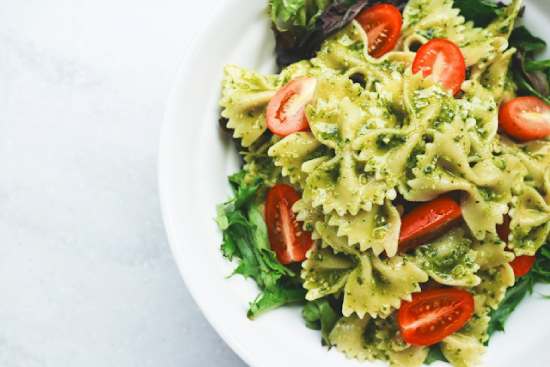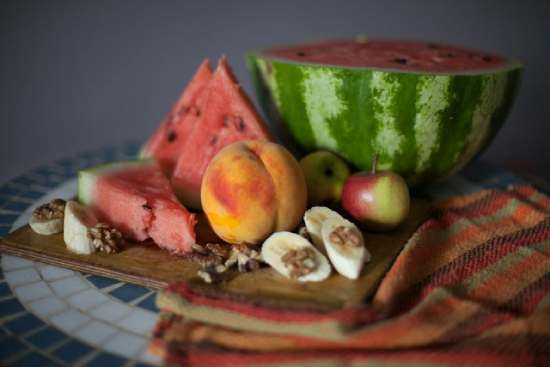What Do Seventh-day Adventists Choose to Eat?
Food blogs overwhelm the internet; food fads are all the rage; and copycat and healthy versions of food are the subject of many a get-together.
Eating—and eating the best way—is a big deal.
And everybody has a different idea about it.
Seventh-day Adventists have their own way of eating, too, although it doesn’t stem from all the food craze of modern times. We have been eating in a specific way since the 1800s.
So what do Adventists eat? Do we eat meat or shellfish? Or eggs?
We’ll cover all those questions in this article, and more, including:
- What Adventists eat
- How we choose what to eat
- Where Adventist health principles come from
- Why these choices matter to Adventists
So, let’s get into what Adventists fill their plates with.
What Adventists eat

Photo by Melissa Belanger on Unsplash
Adventists try to live a healthy lifestyle, and that includes eating as many natural, whole foods as possible while avoiding processed foods.
It looks different for different cultures within Adventism, but, in general, here’s how Adventists interact with some basic food groups:
Meat: While some Adventists do eat animal products, many leave them on the shelf, opting instead for plant-based foods. Of those who do eat meat, they typically stick to clean meat as described in the Bible (we’ll get to that more in a bit).
Dairy: Many Adventists (about 90%1) eat at least some form of dairy, whether eggs, milk, cheese, or butter. Some eat all of it, while others eat a mixture of dairy and plant-based products like soy milk, almond milk, or non-dairy spreads. A smaller group of Adventists don’t eat any dairy products at all—either because of allergies or personal choice.
Caffeine: Depending on availability, culture, and personal conviction, Adventists may or may not choose to drink caffeinated beverages,2 such as sodas, coffee, or tea.
Alcohol: The church’s official beliefs discourage the use of alcoholic beverages, and most Adventists avoid them because of their well-known damaging effects on physical and mental health.
Grains: Adventists try to eat whole grains—whatever is available or common—as much as possible.
Vegetables: Adventists understand the crucial health benefits of vegetables! We try to eat a wide variety and plenty of them.
Fruit: We also try to incorporate a lot of fruit into our meals for their wonderful flavor and health benefits.
Legumes (Beans): For Adventists, especially those who are vegetarians or vegans, beans, lentils, and other legumes are a staple in our cupboards and an important source of protein.
Based on this, what might an Adventist meal look like?
Adventist meals

Photo by Ella Olsson on Unsplash
While every culture will serve different meals, here are some typical meals for Adventists in North America:
Breakfast:
- Plenty of fruit
- Oatmeal or some other grain like pancakes or bread
- A healthy cereal
- Eggs
Lunch: Some Adventists make lunch their biggest meal of the day. In this case, they have a couple of the following at the meal:
- A cooked vegetable or salad
- A whole grain bread or rolls
- A main dish, such as a casserole, a rice with curry, a hearty soup, or a pasta dish
Some Adventists also eat haystacks, a traditional taco salad-like dish.
If lunch is not the main meal, we might opt for something simple—sandwiches, salads, fruit, or vegetables and dip.
Supper: This is the same idea as lunch. If the main meal was eaten at lunch, supper is typically a lighter meal. If lunch was lighter, supper would be the biggest meal.
Desserts: Adventists love desserts, just like anyone else! Depending on their specific food choices, they may make cakes or pies and simply omit animal products. They may also cut down on sugar or butter if the recipe calls for a lot.
Drinks: Water is the beverage of choice for most Adventists, though they also enjoy fruit juices, sparkling water, smoothies, and other similar drinks. As noted above, most Adventists avoid alcoholic drinks, and some avoid caffeinated ones.
Now that you have a broad picture of what Adventists eat, you might be wondering, why are so many Adventists vegetarian—or vegan? Why do they stay away from caffeine or alcohol? Let’s look into the reasons behind these choices.
How Adventists choose what to eat

Photo by Eaters Collective on Unsplash
Many Adventists are careful about consuming meat, caffeine, alcohol, and even dairy because they desire to care for their bodies as temples (dwelling places) of the Holy Spirit (1 Corinthians 6:19). Our bodies are temples because Jesus Christ created them and saved them through His death, so our goal is for our bodies to reflect and glorify God and what He’s done for us. By keeping our bodies as healthy as we can, we can think more clearly and serve God more effectively.
But this doesn’t mean Adventists are required to eat a certain way.
About half of Adventists do eat meat. And many Adventists will sprinkle cheese on their potluck dinner or drink a cup of coffee at breakfast.
The decision is up to each individual person, and what they eat is between them and God.
The Bible contains some guidelines about food, which helps Adventists form their conclusions.
Where Adventist health principles come from
Adventist health principles come from verses like 1 Corinthians 6:19–20:
“Or do you not know that your body is a temple of the Holy Spirit within you, whom you have from God? You are not your own, for you were bought with a price. So glorify God in your body” (ESV).
In the same epistle, Paul offers this advice, too:
“Therefore, whether you eat or drink, or whatever you do, do all to the glory of God” (1 Corinthians 10:31, NKJV).
Regardless of what shoulds or shouldn’ts society places on food and drinks, the Bible calls us to approach these decisions through its guiding principles. Principles like caring for our bodies in the best way possible and living to honor God.
Here’s what that might look like:
Is eating a cheeseburger and fries better for our bodies than a homemade sub sandwich on whole-grain bread? Probably not. But this doesn’t mean we never eat a cheeseburger and fries. Rather, we might save it for a treat instead of eating it often.
What about a six-pack at a football game? All the guys might be having a beer, but knowing that it can impair judgment and harm physical health might lead an Adventist to opt for juice or water instead.

Photo by Roman Davayposmotrim on Unsplash
Though the Bible doesn’t give us a long list of instructions for what to eat, it does offer some guidelines.
For one, it presents us with the original food God gave Adam and Eve—fruits, nuts, and grains (Genesis 1:29). These were God’s choices for the ideal function of our bodies, though, after the flood, He permitted people to eat meat as well (Genesis 9:3).
In allowing the eating of meat, God gave some specific guidelines to distinguish between clean and unclean meat. They can be found in Leviticus 11. One of these guidelines reads:
“‘These are the animals which you may eat among all the animals that are on the earth: Among the animals, whatever divides the hoof, having cloven hooves and chewing the cud—that you may eat” (Lev 11:2–3, NKJV).
Clean animals have a cloven (or split) hoof and chew the cud. Cows have a cloven hoof and chew their cud, so beef would be considered a clean meat. Pigs, on the other hand, have a cloven hoof but do not chew their cud. So pork would fall in the category of unclean meat.
Today we can see why God gave these instructions. Cows typically eat grass or grain, but pigs are scavengers that often eat undesirable leftovers and can carry diseases.
And while God gave these principles to the Israelites, He had these dietary laws in place before formally giving them to the Israelites. When God asked Noah to build an ark and prepare for a worldwide flood, He told Noah:
“You shall take with you seven each of every clean animal, a male and his female; two each of animals that are unclean, a male and his female” (Genesis 7:2, NKJV).
Noah knew the difference between clean and unclean animals about 2,000 years before God gave the Israelites dietary instructions.
Ultimately, these instructions were designed to bless everyone with good health. Now, we have the added benefit of modern research, which is confirming the health benefits of eating the way God intended.
Why healthy eating choices matter to Adventists

Photo by Jason Briscoe on Unsplash
Regardless of the exact diet we choose, Adventists care about healthy living because it helps us to experience the most fulfilling and satisfying life. After all, God created us and knows best what can fuel our bodies and make us truly happy.
Healthy eating helps us think clearly, gives us more energy, and even increases our life expectancy. It helps prevent sickness—either general or serious problems like heart disease—promotes lower cholesterol, and helps prevent obesity.3
Of course, this doesn’t mean that if you follow a healthy diet you won’t get sick.
At times, we have to deal with the effects of simply being in a sinful, broken world. But we still have the choice to do all we can to fortify ourselves and enjoy the greatest amount of benefit.
However, we are not made righteous through eating habits. A person who follows a biblical diet isn’t “more holy” than one who doesn’t. We are holy because of Christ’s righteousness—and following His guidelines out of love is just a way to experience the abundant life He wants for us (John 10:10).
To find out more about how Adventists eat and why,
- “Adventist Health Study-2,” Loma Linda University Health, https://adventisthealthstudy.org/studies/AHS-2. [↵]
- “What Adventists Believe About Christian Behavior,” The Seventh-day Adventist Church, https://www.adventist.org/christian-behavior/. [↵]
- “Healthy Lifestyle Reduces Risk of Disease, Death,” Boston University Chobanian and Avedisian School of Medicine, https://www.bumc.bu.edu/camed/2020/03/13/healthy-lifestyle-reduces-risk-of-disease-death/. [↵]
Questions about Adventists? Ask here!
Find answers to your questions about Seventh-day Adventists
More Answers
Why Many Seventh-day Adventists Choose a Vegetarian Diet
Why Many Seventh-day Adventists Choose a Vegetarian Diet?You may have an Adventist friend who is vegetarian, or maybe you’re attending a Seventh-day Adventist Church for the first time and notice the potluck doesn’t have any meat. This isn’t unusual in Adventism. In...
The Health Benefits of Fresh Air You Should Know About
The Health Benefits of Fresh Air You Should Know About“When you can’t breathe, nothing else matters,” the American Lung Association tells us. And while that’s true, the kind of air you’re breathing will determine the health benefits you experience. Breathing fresh...
10 Incredible Ways Sunlight Can Improve Your Health
10 Incredible Ways Sunlight Can Improve Your HealthAre you concerned about sunlight’s negative effects? You might be the one who lathers on the sunscreen and covers up when you go outside. Or maybe you avoid being outside as much as possible. You might be surprised,...
Why Is Water So Important?
Why Is Water So Important?We all know that water is a substance we can’t live without. It quenches our thirst and keeps us hydrated on the inside. And it’s necessary for hygiene and cleansing on the outside too. But did you know that the cleansing properties of water...
Ellen White’s Writings and the Adventist Health Message
Seventh-day Adventists are known for their emphasis on healthy living. And Ellen G. White was a significant influence in the development of this priority and practice among Adventists.
Health Clinics
Ellen White and Adventist Healthcare—Ahead of Their Time Medical care in the mid-1800s was primitive, to say the least. Basic concepts we take for granted—such as proper handwashing or recognizing the dangers of bloodletting—were nonexistent. And doctors often had...
What Did Ellen White Teach about Vegetarianism?
What Did Ellen White Teach about Vegetarianism?One thing you might have heard about Seventh-day Adventists is their emphasis on a vegetarian lifestyle. If you’re wondering why that is, it goes back to our church’s humble beginnings: As Adventists studied the Bible,...
How Ellen White’s Teachings Can Improve Your Health
How Ellen White’s Teachings Can Improve Your Health Healthcare in the nineteenth century was said to leave “more disease than it took away” with its use of bloodletting and “medicines” like mercury and arsenic.1 As people questioned these methods, new approaches...
Change Your Perspective on Life with These 5 Mindsets
5 Biblical Mindsets to Change Your Life for the Better Sometimes, life is just plain hard. There’s no way around it. So would thinking about things differently really change anything? Our perspective on life, and everything it throws at us, affects more than we’re...
Bible Promises for When You’re Worried or Fearful
Bible Promises for When You’re Worried or Fearful The Bible is full of beautiful promises that can comfort us in a variety of situations. They can give us hope when we are hopeless, make us feel grateful for God’s love, and comfort us when we’re grieving or suffering....
12 Practical Ways to Overcome Worry
12 Practical Ways to Overcome Worry DISCLAIMER: This content is for informational purposes only. It does not constitute any professional medical advice and is not intended as a substitute for professional mental health therapy. It’s easy to get stuck in a cycle of...
How the Bible Talks About Worry, Fear, and Anxiety
How the Bible Talks About Worry, Fear, and Anxiety Worry and fear are the ingredients of anxiety. It’s easy to see how the world isn’t perfect—and the anticipation of a bad event or experience (that may or may not even happen) can end up draining the peace and...
How to Calm Anxious Thoughts, Using the Bible
How to Calm Anxious Thoughts, Using the Bible You were expecting a phone call from your daughter half an hour ago, and she still hasn’t called. She’s also not answering your calls. You feel your heart thumping as your thoughts race: What if she’s been in a car...
What You Should Know About the Adventist Health Studies
What You Should Know About the Adventist Health StudiesYou may have heard that Seventh-day Adventists care about health. But what you may not know is that Adventists have been the subjects of long-term research into lifestyle and health. Since 1958, researchers from...
Benefits of Sunlight
Yes, There Are Health Benefits of SunlightDespite the bad reputation it’s gotten, sunlight is generally associated with positivity, as shown by songs like “You Are My Sunshine,” or phrases that refer to delightful people as having a “sunny disposition.” There’s a...
Why Your Body Needs Rest for Optimal Health
Why Your Body Needs Rest for Optimal HealthStruggling to think straight? Wondering why you can’t remember that important tidbit you heard earlier today? Feeling like your emotions are about to explode? These are just some of the symptoms that can reveal your need for...
The Seventh-day Adventist Diet: One of Our Key Longevity Secrets
The Seventh-day Adventist Diet: One of Our Key Longevity SecretsOats, avocados, lentils, tofu—probably not what you first think of in a standard American diet. But if you show up at the home of an Adventist, chances are you may be served one of these staples. Out of a...
Why You Need Fresh Air
Why You Need Fresh Air“When you can’t breathe, nothing else matters,” the American Lung Association tells us. We couldn’t agree more! Breathing in clean air is an essential part of caring for our bodies, which God has given us. Together with other health principles,...
Sabbath Meal
Everything You Need to Know About Sabbath MealsFor Seventh-day Adventists, sharing a Sabbath meal with friends and family is one of the most special and memorable parts of the Sabbath. That’s why we want to share with you all about Sabbath meals and why they’re such a...
Adventists and Healthy Living
Adventists and Healthy LivingWhat’s the Adventist “Health Message” All About? One thing Seventh-day Adventists are known for is their emphasis on living healthy lives. Since our bodies are living temples of the Holy Spirit (1 Corinthians 6:19, 20), we strive to stay...
Water’s Importance—Physical Benefits and Spiritual Applications
Water’s Importance—Physical Benefits and Spiritual Applications We all know that water is a substance we can’t live without. Not only does it quench our thirst and keep us hydrated from the inside, but it’s necessary for hygiene and cleansing on the outside as well....
How Important is a “Day of Rest?”
How Important is a “Day of Rest?” Why God Created a Day for Downtime by Martin Casper Do you ever experience the feeling of complete overload? Do you feel like the only way you can get ahead is by slamming it 24/7? I hear these types of comments more and more...
7 Reasons Why a Day of Rest is Important
7 Reasons Why a Day of Rest is ImportantWe live in a fast-paced world. It seems as if success is measured in how much you can do in a short amount of time. (Extra points for the service or product that is available 24/7). The idea that we will be more successful if we...
How do Adventists choose what to eat?
How do Adventists choose what to eat?Every day, parents go through the ritual of getting their kids to eat what is healthy and good while trying to steer them away from what can hinder the growth of their developing bodies. Nutritionists work with their clients to...
How Can I Have a Better Marriage?
Is it possible to have a happy marriage?
Why are many Adventists Vegetarian?
Why are many Adventists Vegetarian?The diet intended for man is outlined in Genesis 1:29, “And God said, ‘See, I have given you every herb that yields seed which is on the face of all the earth, and every tree whose fruit yields seed; to you it shall be for food.’”...
Didn’t find your answer? Ask us!
We understand your concern of having questions but not knowing who to ask—we’ve felt it ourselves. When you’re ready to learn more about Adventists, send us a question! We know a thing or two about Adventists.



















